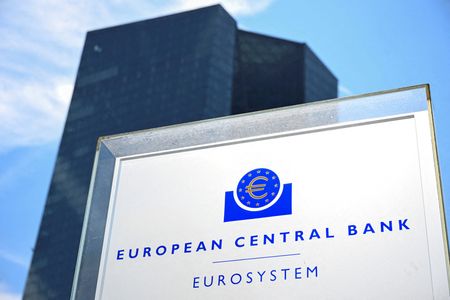FRANKFURT (Reuters) -Euro zone banks must prepare for unprecedented shocks causing severe disruptions with far-reaching consequences for financial systems, the European Central Bank said on Tuesday as it outlined its supervisory priorities for the next three years.
The ECB has long argued that banks face a new reality with more frequent shocks from tariffs to cyberattacks, requiring them to be prepared for a range of possibilities without knowing the exact nature of the next crisis.
This requires healthy capital buffers, up-to-date technological infrastructure, a proactive management that is in tune with the financial realities, and more intrusive supervision.
UNPRECEDENTED RISK OF EXTREME, LOW PROBABILITY EVENTS
“Geopolitical tensions and shifting trade policies, climate and nature-related crises, demographic change and technological disruptions are exacerbating structural vulnerabilities, making the likelihood of extreme, low-probability events unprecedentedly high,” the ECB said in a statement.
This is why strengthening banks’ resilience to political risk and uncertainties will remain the ECB’s top supervision priority, with a focus on prudent risk-taking and adequate capitalisation, the ECB said.
Given the unpredictable nature of these risks, the ECB plans to carry out a reverse stress test, in which it will hand out levels of capital depletion and tell each bank to come up with scenarios that could cause them.
For now, though, banks are doing well. They are resilient, profitability is strong and asset quality is stable, thanks in part to steady economic growth and stable inflation, the ECB said.
That is why their overall capital requirements will remain stable this year and a non-binding buffer, called Pillar 2 guidance, will actually ease.
Overall Common Equity Tier 1 capital (CET1) requirements and guidance applicable in 2026 will be steady at 11.2%, the bank said.
BENIGN ENVIRONMENT UNLIKELY TO LAST
Such a benign environment is unlikely to last, however, the ECB said.
“Significant downside risks persist, particularly as a result of U.S.-EU trade tensions and broader geopolitical risks, which could affect sectors with high export volumes to the United States, such as the automotive, chemicals or pharmaceutical sectors, potentially causing asset quality to decline,” the ECB said.
Financial markets are also prone to sudden corrections with policymakers warning that asset prices do not accurately reflect political risk, leading to excessive valuations.
To mitigate risks, the ECB will prioritise prudent risk-taking and sound credit underwriting standards to prevent the emergence of future non-performing loans, the ECB said.
(Reporting by Balazs Koranyi;Editing by Francesco Canepa and Conor Humphries)









